|
INTRODUCTION
Bronze Age (c. 3000-1100 BCE)
- Early Bronze Age
(c. 3000-c. 2000 BCE)
- Middle Bronze Age
(c. 2000-c. 1500 BCE)
- Late Bronze Age
(c. 1550-c. 1100 BCE)
Iron Age (begins c. 1200 BCE)
Aegean - Helladic - Hellenic - Hellenistic (c. 3000-31 BCE)
- Aegean (c. 3000-1100 BCE)
- Cycladic
(c. 3000-c. 1600 BCE)
- Minoan
(c. 3000-c. 1400 BCE)
- Helladic (Pre-Hellenic) (c. 3000-1100 BCE)
- Mycenaean
(c. 1400-1100 BCE)
- Hellenic (c. 1100-323 BCE)
- Dark Age
(c. 1100-900 BCE)
- Geometric
(c. 900-700 BCE)
- Orientalizing
(c. 700-600 BCE)
- Archaic
(c. 600-480 BCE)
- Period of Transition (Early Classical)
(c. 480-450 BCE)
- High Classical
(c. 450-400 BCE)
- Late Classical
(The Fourth Century) (c. 400-300 BCE)
- Hellenistic
- Hellenistic
(c. 323-31 BCE)
(NOTE: In 31 BCE, Octavian defeated Mark Antony in the Battle of Actium (naval battle off a promontory on the western coast of Greece) and became the undisputed master of the Roman world as the emperor Augustus. The battle signalled the end of the absorption of the Hellenistic kingdoms into the Roman empire)
How Do We Learn About Ancient Greek Art?
- Surviving Objects and Buildings
- Written Sources
- Various written sources survive the study of which help us learn about the Ancient Greece. Several of these sources are available online through The Ancient History Sourcebook: Greece. Among the more important ancient sources of information for art historians and archaeologists are:
- Pliny the Elder (G. Plinius Secundus, c. 27-79 CE). Roman encyclopedist, born near Lake Como in Italy. He wrote a 36-volume Natural History in the mid-1st century CE which survives as the most comprehensive source for the history of Greek painting and sculpture of the Classical period (5th and 4th centuries BCE).
- Pausanias (2nd century CE) was a Greek traveller and antiquarian. He was the author of a 10-volume Descriptions of Greece.
- Epigraphy (study of inscriptions)
- Numismatology (study of ancient coins)
- Archaeology
Mythical Beginnings
Europa, Zeus and Minoan Crete
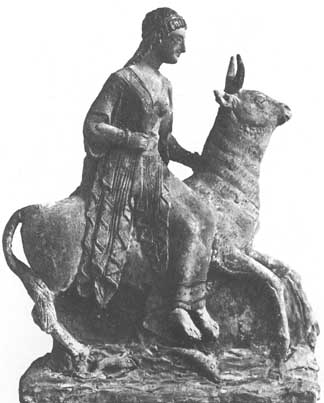
Europa and the Bull
The story of Europa and how she is abducted and raped by Zeus is told by the Roman poet Ovid (43 BCE - 17 CE) in Book II of his Metamorphoses.
Zeus, the king of the gods, enamoured of Europa, the daughter of King Agenor of Sidon in Phoenicia, disguises himself as a beautiful white bull. Europa and her companions deck him with flowers and she innocently climbs onto his back. He then makes his way to the shore, and without warning, plunges into the waves and carries her off to the island of Crete. There she bore Zeus three sons, one of whom was named Minos who became King of Crete. His wife, Pasiphae, following the consummation of her passion for a white bull, gave birth to the Minotaur whom the Greek hero Theseus killed with the assistance of Ariadne, the daughter of Minos.
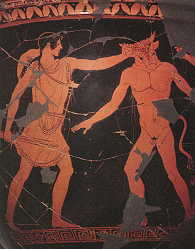
Theseus and the Minotaur
Paris, Helen, and the Trojan War
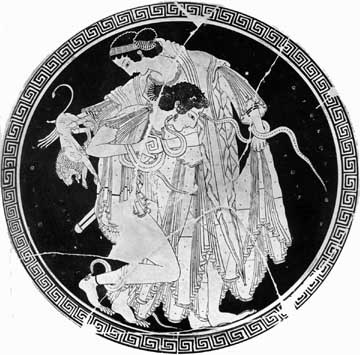
Peleus wrestling with Thetis
Peleus was a mortal hero who had taken part in the voyage of the Argonauts and had fought with the Lapiths against the Centaurs. He wished to marry Thetis, a Nereid (an aquatic daughter of Nereus), but first he had to overcome her resistance. She attempted to escape him by turning into herself successively into fire, water, a lion, and a serpent. But, on the advice of the centaur Chiron, Peleus held on and succeeded in winning her. All the Immortals were invited to their wedding feast, except Eris (Discord). Infuriated, Eris tossed in the hall where the guests were gathered a golden apple inscribed with the words For the Fairest.
The goddesses Hera, Athena, and Aphrodite all claimed it. To settle the argument, Zeus directed that the judgement be made by a mortal and the choice fell upon Paris (Alexandros), the son of the King of Troy. Hermes conducted the three goddesses to Phrygia where Paris was tending his father's sheep on the slopes of Mount Ida. Each of the goddesses appeared before him and attempted to influence his decision with gifts and promises.
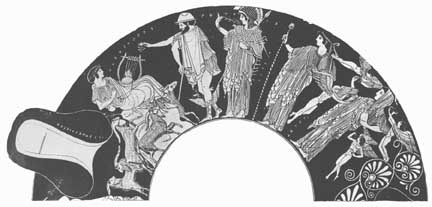
The Judgement of Paris
Hera said "If you award the prize to me, I shall make lord over all Asia." Athena promised to make him always valorous in battle. Aphrodite, loosened her clothing and unknotted her girdle and promised him the beautiful mortal woman in the world.
Paris awarded Aphrodite the golden apple and won for himself Helen, the wife of Menelaos of Sparta. Paris abducted her and carried her off to Troy. Menelaos, whose position as king was thereby made insecure, enlisted the help of all Greece in an effort to get her back. The Greeks agreed to help and a massive force sailed for Troy under the leadership of Menelaos's brother Agamemnon, King of Mycenae. The ensuing war lasted ten years.
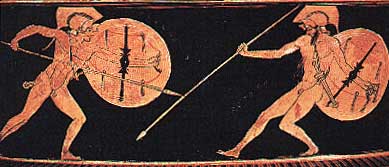
Achilles and Hector
 More than any other event in their history, the Trojan War deeply stirred the imagination of the ancient Greeks. An episode from the war is celebrated in Homer's monumental poem the Iliad. The central hero in Homer's story is Achilles, the son of Peleus and Thetis. The Odyssey tells the story of Odysseus, one of Greek warriors who fought at Troy, and his long journey home after the war. More than any other event in their history, the Trojan War deeply stirred the imagination of the ancient Greeks. An episode from the war is celebrated in Homer's monumental poem the Iliad. The central hero in Homer's story is Achilles, the son of Peleus and Thetis. The Odyssey tells the story of Odysseus, one of Greek warriors who fought at Troy, and his long journey home after the war.
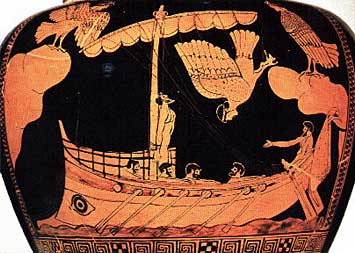
Odysseus and the Sirens
Athena and Athens
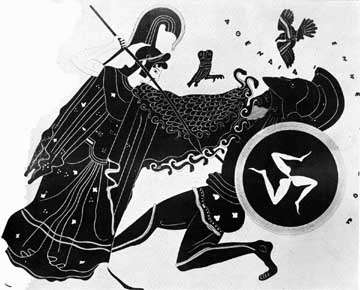
Athena battling the giant Enceladus
Athena (or Athene) was venerated as a warrior-goddess, as goddess of the arts of peace, and as goddess of prudent intelligence. She was also the protectress of towns and the guardian of acropolises and the patron of architects, sculptors, spinners, and weavers. She was renowned for her wisdom. The olive tree was sacred to her, and her emblem was the owl.
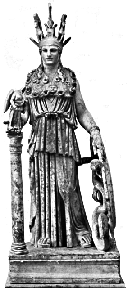
Athena Parthenos
She was honoured throughout Greece and enjoyed a special cult in Athens where temples were built to her on the Acropolis: the Parthenon, the temple of Athene Nike, and the Erechtheum.
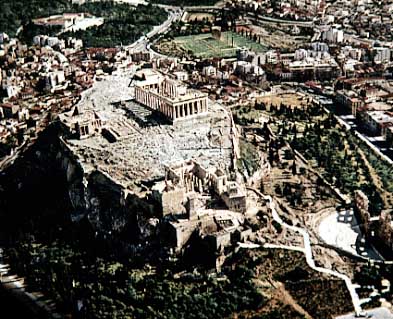
Aerial View of the Acropolis, Athens
Among the most important festivals in Athens celebrated in her name was the Panathenaea which dated from the time of Theseus. It consisted of a solemn procession which carried to the Acropolis a peplos to drape on the goddess's statue. Races, gymnastic games, contests of music, singing and dancing were held during the Panathenaea.
As a warrior-goddess, Athena protected heroes, helping Hercules, Perseus, and Jason.
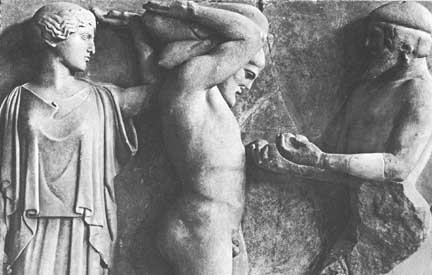
Athena assists Hercules in his 11th Labour
Atlas brings Hercules the apples of Hesperides
The god Hephaestus became enamoured of Athena and attempted to rape her. She fled and but he caught her. She defended herself so successfully that Hephaistos ejaculated onto the earth, which shortly thereafter gave birth to Erichthonius. Athena found the child and raised him without the knowledge of the other gods. When he was grown, Erichthonius became king of Athens, where he established the cult of Athena.
An earlier episode tells of a quarrel that had arisen between Poseidon and Athena over the possession of Attica (the district of which Athens was the chief city). In order to demonstrate his claim, Poseidon struck a rock with his trident and caused a salt water spring to gush forth. Athena, in her turn caused an olive tree to grow on the stony surface of the Acropolis. This olive tree, which grew in the Pandrosium near the temple known as the Erechtheion (421-405 BCE) on the Athenian Acropolis, could still be seen in the time of Pericles in the 5th century. The gods settled the dispute by awarding Attica to Athena; the city of Athens was consequently named after her.
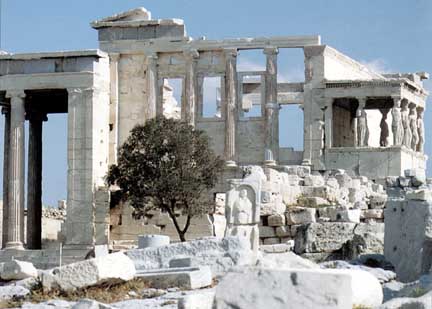
Athena's olive tree today
next to the Erechtheion
|

 SPRING 2016
SPRING 2016  SCHEDULE
SCHEDULE  REQUIREMENTS
REQUIREMENTS

 SPRING 2016
SPRING 2016  SCHEDULE
SCHEDULE  REQUIREMENTS
REQUIREMENTS